The People Versus… Alien Covenant (2017).
At Film ’89 we like to celebrate film but occasionally a movie comes along that isn’t necessarily deserving of celebration. In this first in a new regular feature for Film ’89, we take a look at a film that was either generally praised or divided audiences and put it on trial, albeit a fair and just trial, to determine whether it actually is a great film, a woefully underwhelming one or just guilty of being run-of-the-mill. In time for its Blu-Ray/DVD release, we put on trial Ridley Scott’s latest entry in the franchise he started way back in 1979, Alien: Covenant. Ladies and gentlemen of the jury, please be seated, court is in session.
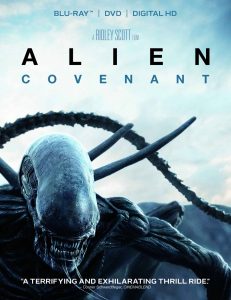 In 2012 acclaimed director Ridley Scott returned to the universe he’d helped create in Alien, his seminal 1979 melding of science fiction and horror. That return came in the form of his pseudo-prequel Prometheus. I’ve previously written lengthy retrospectives of Alien and it’s three direct sequels but I stopped short of Prometheus. Thinking back as to why I chose not to revisit Prometheus, I can only deduce that my feelings towards it at the time were still in something of a trough. Prometheus was a film that I liked less and less upon subsequent viewings. Each viewing would uncover yet another ill-considered plot element or inconsistency that I felt damaged the mythos that had been so carefully crafted in the earlier films in spite of the often stunning visuals. The problems with Prometheus can be traced to its pre-production when writer Jon Spaihts was replaced by Damon Lindelof. If the available information is to be believed, Spaihts’ script was far more of a direct prequel to Alien. The planet featured was LV-426, the same planet where Ripley first came into contact with the Xenomorph in Alien and to which she would later return in Aliens. When Lindelof suggested that significant changes be made to the screenplay so as to make it far less of a direct prequel, Scott agreed and allowed Lindelof to begin making the changes through numerous rewrites. One of the changes was to make the planet a different one to the one seen in Alien and so the planet in Prometheus was changed to LV-223. Another was to push aside the focus on the Xenomorphs and make Prometheus its own film with its own unique themes set within the Alien universe but not directly related to it.
In 2012 acclaimed director Ridley Scott returned to the universe he’d helped create in Alien, his seminal 1979 melding of science fiction and horror. That return came in the form of his pseudo-prequel Prometheus. I’ve previously written lengthy retrospectives of Alien and it’s three direct sequels but I stopped short of Prometheus. Thinking back as to why I chose not to revisit Prometheus, I can only deduce that my feelings towards it at the time were still in something of a trough. Prometheus was a film that I liked less and less upon subsequent viewings. Each viewing would uncover yet another ill-considered plot element or inconsistency that I felt damaged the mythos that had been so carefully crafted in the earlier films in spite of the often stunning visuals. The problems with Prometheus can be traced to its pre-production when writer Jon Spaihts was replaced by Damon Lindelof. If the available information is to be believed, Spaihts’ script was far more of a direct prequel to Alien. The planet featured was LV-426, the same planet where Ripley first came into contact with the Xenomorph in Alien and to which she would later return in Aliens. When Lindelof suggested that significant changes be made to the screenplay so as to make it far less of a direct prequel, Scott agreed and allowed Lindelof to begin making the changes through numerous rewrites. One of the changes was to make the planet a different one to the one seen in Alien and so the planet in Prometheus was changed to LV-223. Another was to push aside the focus on the Xenomorphs and make Prometheus its own film with its own unique themes set within the Alien universe but not directly related to it.
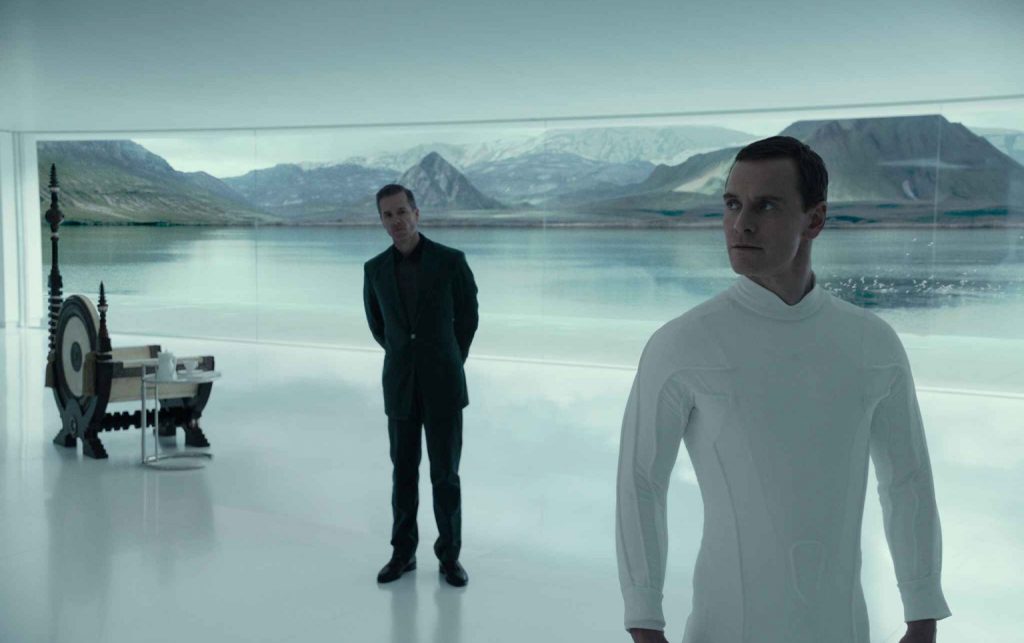
The final film was met with, at best, some fair to middling critical reception and wasn’t the massive commercial success that Fox had hoped it would be. Even the film’s initial marketing strategy wasn’t sure if the final film was a full blown Alien prequel or something else entirely. One of its biggest fumbles was the depiction of a crew whose illogical and often stupid actions make them fairly comparable to the teenage fodder of slasher films. Compare this to the exemplary cast and stunningly organic performances of the 1979 original and Prometheus comes off as something of a pale imitation. The way it deals with the lore and established continuity of the previous films shows signs of an almost flagrant ignorance of what went before it and left the majority of viewers mulling over more questions than the film cared to answer. Prometheus remains a visually stunning but ultimately rather frustrating film.
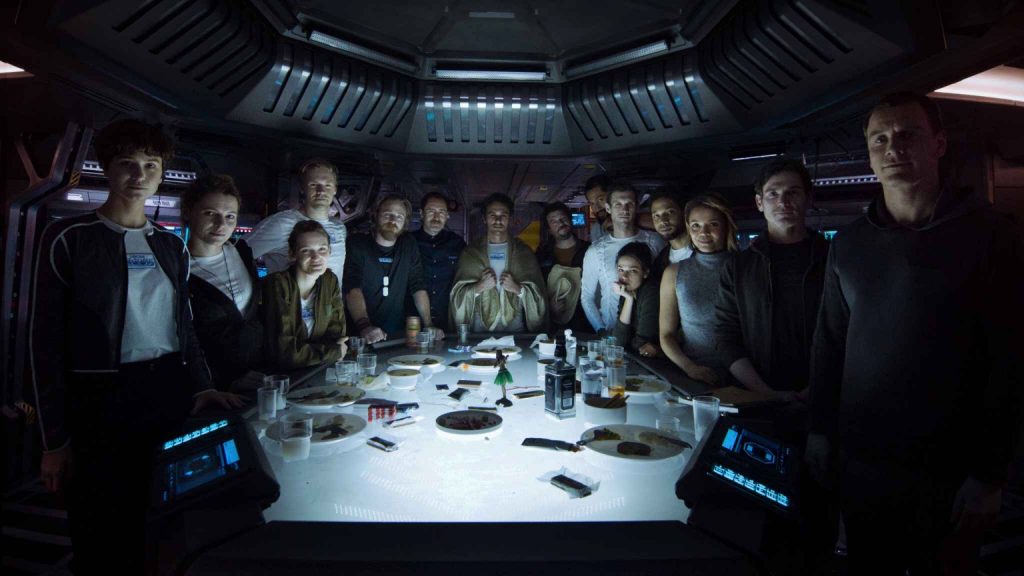
Five years on from Prometheus, Ridley Scott has delivered the next chapter and in fairness to him, as seen in interviews given around the time of the film’s release, admitted he got Prometheus wrong. His latest foray into the world of Xenomorphology is Alien: Covenant. Much like Prometheus, the title relates to the name of the spaceship, in this case the huge colonisation vessel Covenant and its crew consisting of Daniels (Katherine Waterston), the religious second in command Oram (Billy Crudup) and the artificial human Walter (Michael Fassbender), amongst others who are the custodians of the ship’s cargo of 2,000 humans in stasis. Their aim, to colonise a distant habitable planet. It’s at this juncture that I must veer into full-on spoiler territory. If I’m to offer a fair analysis of Alien: Covenant then I’m afraid a spoiler free review would only come across as vaguely non-specific in its criticism. In order to fully address and communicate my feelings about the film I feel I must delve into specifics that are unavoidable spoilers so if you didn’t catch the film upon its theatrical release and don’t want to have the it spoilt then please stop reading now.
***** SPOILER ALERT ******
En route to said planet the crew of the Covenant intercept a transmission that appears to be from a human female. It’s this first space bound portion of Covenant that’s the most well crafted in its simplicity. There are some great effects shots of the huge vessel’s interior and exterior as well as an underlying sense of tension mixed with hints of the well crafted crew interactions that made Alien so effective. Unfortunately they are just hints. The crew are never fleshed out to anything approaching the same depth nor are the performances in any way the match of Alien. The sense of a crew with a defined hierarchy and incredibly organic quality that was so apparent in Alien is here but to a much lesser degree. We learn very little about our protagonists save for the fact that they are mostly couples and we see some of them suffer tragic losses, losses that have no impact as we are given no time with those who are killed beforehand. The script is very generic insomuch as our characters’ dialogue serves as often blunt exposition as to what is quite obviously going on anyway. This undermining of the audience is so against what Scott has done in the past where his films like Blade Runner were imbued with a satisfying and well measured ambiguity.
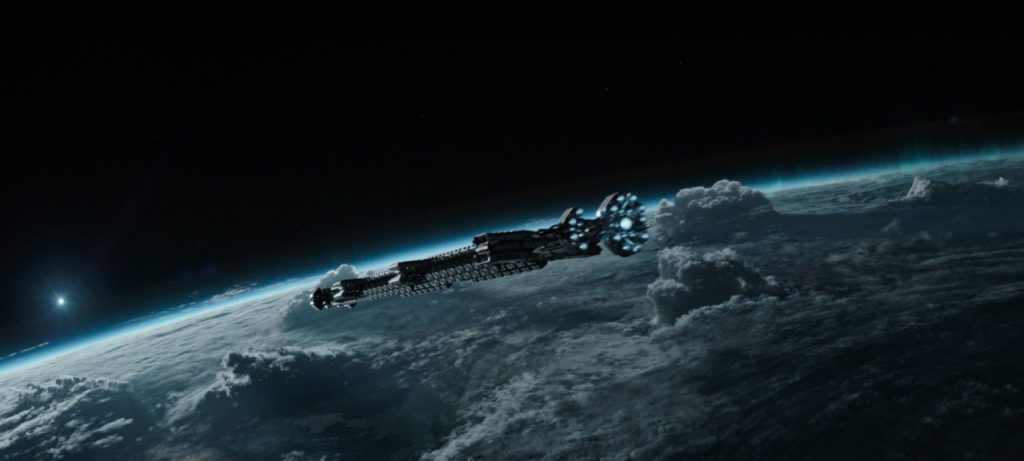
Before long the decision is made by the newly appointed replacement captain to explore the origin of the signal. The planet they land on looks similar to LV-223 and seems perfectly hospitable but soon enough two of the crew members become infected by tiny spores and it’s here that Covenant starts to reaffirm its bastardisation of the well established and very specific biological traits of the alien Xenomorph. These tiny spores very quickly develop into what’s been dubbed the Neomorph, a sort of milky coloured, quasi-hybrid of the creature we saw birthed at the end of Prometheus and the Pokemon character Mewtwo. The Neomorph’s are seen bursting out of the back of one victim and vomited up by another. Whilst both scenes are shockingly visceral, they lack any sort of emotional punch as their hosts are bit part characters with whom we’ve spent hardly any time. Their deaths have little in the way of suspenseful buildup and none of the payoff of similar scenes from any of the previous films, Prometheus included.
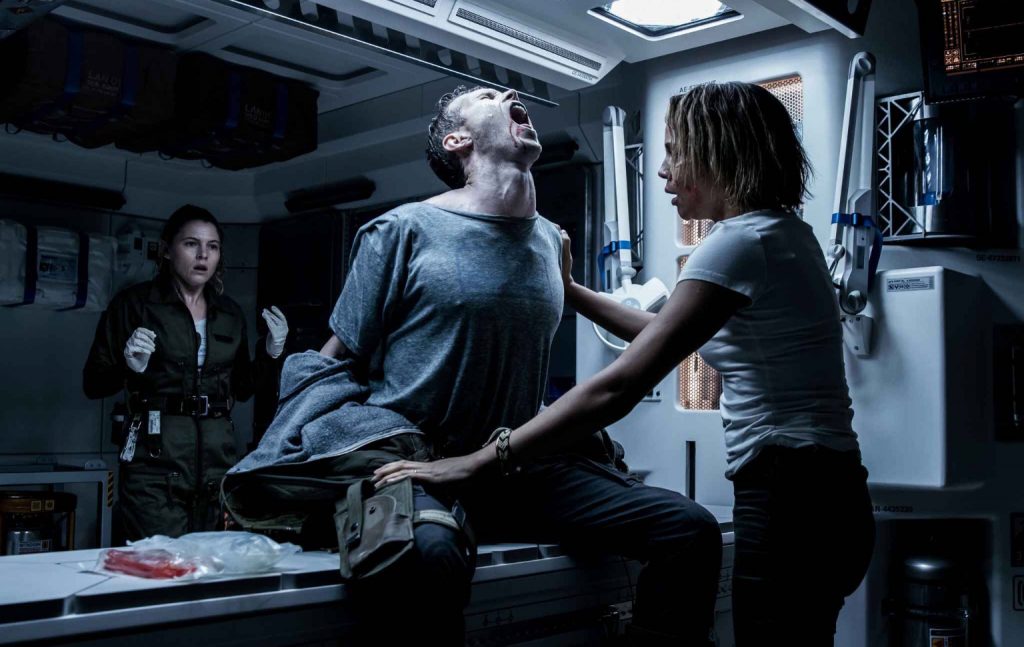
The team suffer even more casualties and are rescued by none other than the android David, last seen in from Prometheus, played once again by Michael Fassbender. His head now back on his body, (the story of which can only be seen in a promotional film released online around the time of the film’s theatrical release and quite frustratingly not part of the actual film itself) Michael has been on this planet for around a decade after the alien ship he and Elizabeth Shaw commandeered crashed there. It’s here that we see several scenes between David and his more advanced but emotionally restricted counterpart Walter. Scott choses to linger upon these scenes where clever but hardly groundbreaking techniques are used to have the actor interacting with himself onscreen. The extended scene of David teaching Walter to play the flute is uncomfortably long and does nothing to propel an already stalling and rather stale narrative. David, so charismatic in his feigned humanity in Prometheus is more extreme here in his innate desire to create life no matter how unnatural. He’s now reduced to almost a caricature of Victor Frankenstein, hellbent on furthering his ghoulish experiments. It’s here, in this rather bloated mid-section that Covenant starts to come off the rails and never recovers. We learn that the alien craft that brought David and Shaw to this previously populated planet dumped its lethal alien pathogenic payload killing the inhabitants outright and that David orchestrated the whole thing. That the inhabitants look like the same race as the Engineers is never followed up on. Little satisfying explanation is given as to Shaw’s demise other than that she died in the crash or was possibly killed by David so as to be a test host for his experiments with the Engineers’ bio-weapons. In a scene reminiscent of the one in Alien: Resurrection where we see the failed efforts to clone Ellen Ripley, we see that David himself has actually successfully engineered the very same eggs and subsequent face-huggers from which the Xenomorphs we know and love are born.
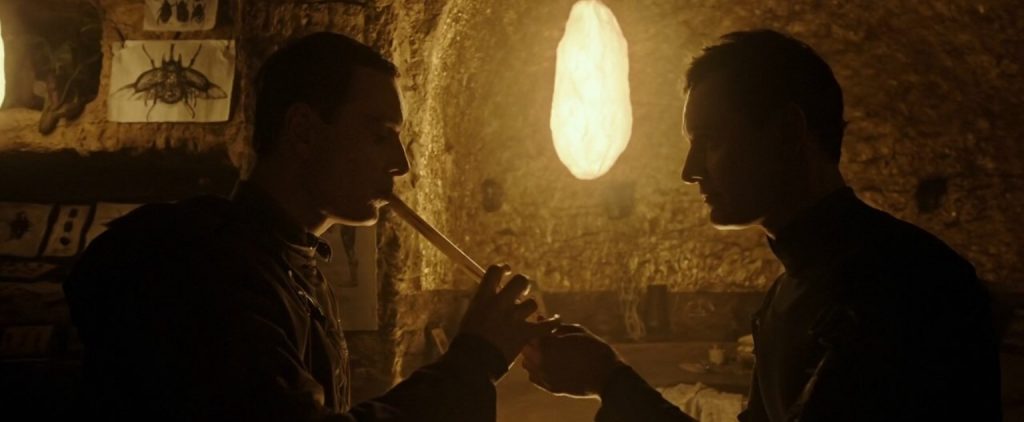
I’m trying to think of the outright positives of Alien: Covenant but again find myself having to address further negatives. The effects on the whole are great, especially the Covenant itself, with the grating exception of the Neomorphs and Xenomorphs themselves who are, for the majority of their screen time, rendered in CG, the end results being something of a mixed bag. The questionable quality of the CG effects strips the creatures of any perceived weight and realism and given that the now 20 year old Alien: Resurrection employed a fine mix of practical and CG effects that remain far more convincing than Covenant’s, I find this rather hard to digest.
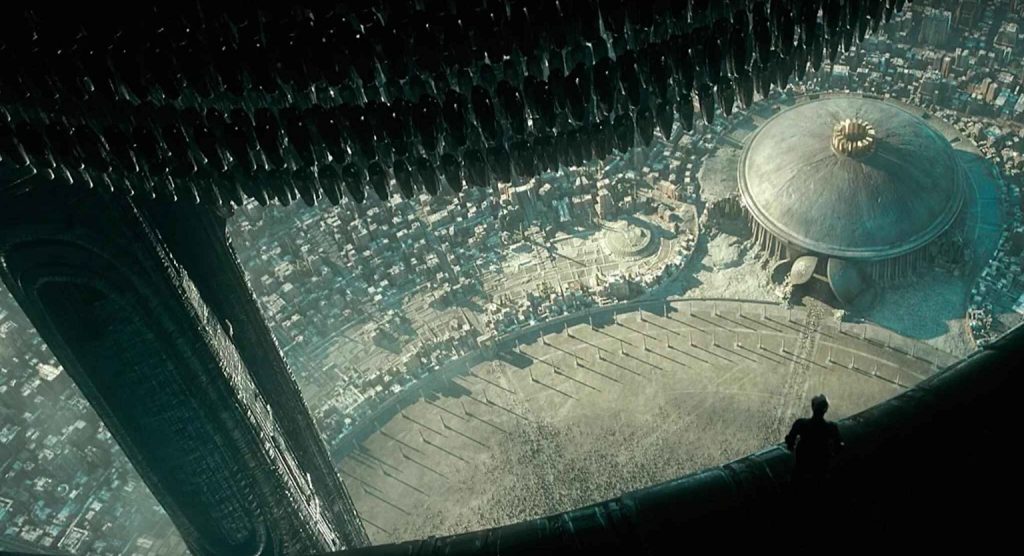
The technical problems don’t hamper the film anywhere near as much as Covenant’s biggest issue which is the unfocused storytelling. Alien: Covenant throws so many variations of the Alien at us in the form of spores, the Neomorph and then the Xenomorph that it damages the established life cycle that made the creature so unique in the first place. What’s worse is that we now learn that this creature, so representative of the word Alien, something very much not of Earth, was in fact created by an artificial human. Does Ridley Scott see this as some sort of poetic irony, that the alien was a byproduct of a creation of mankind and therefore something very much connected to Earth and humanity? This concept may work for some but for this particular fan of the series it’s a plot development that just reinforces a belief that there hasn’t really been a predetermined story arc planned throughout these prequels. What we now learn, and the position in which the story leaves us at the end of Covenant, feels like we’re even further away from the perfect meeting point that will lead up to Ripley & Co. first landing on LV-426 and finding the crashed ship full of Alien eggs. It certainly paves the way for the need for some very creative writing in the next film, if we see Scott’s third prequel at all. Crucially Covenant drops much of the themes that made Prometheus at least a thought provoking piece and an interesting departure for the series. That film’s protagonist, Elizabeth Shaw, left LV-223 at the end determined to find the Engineers’ planet and get some answers as to why they wanted to destroy humanity. None of that is followed up here as Shaw has been killed off but frustratingly Noomi Rapace features in the aforementioned short promotional film so surely she could have featured in Covenant.
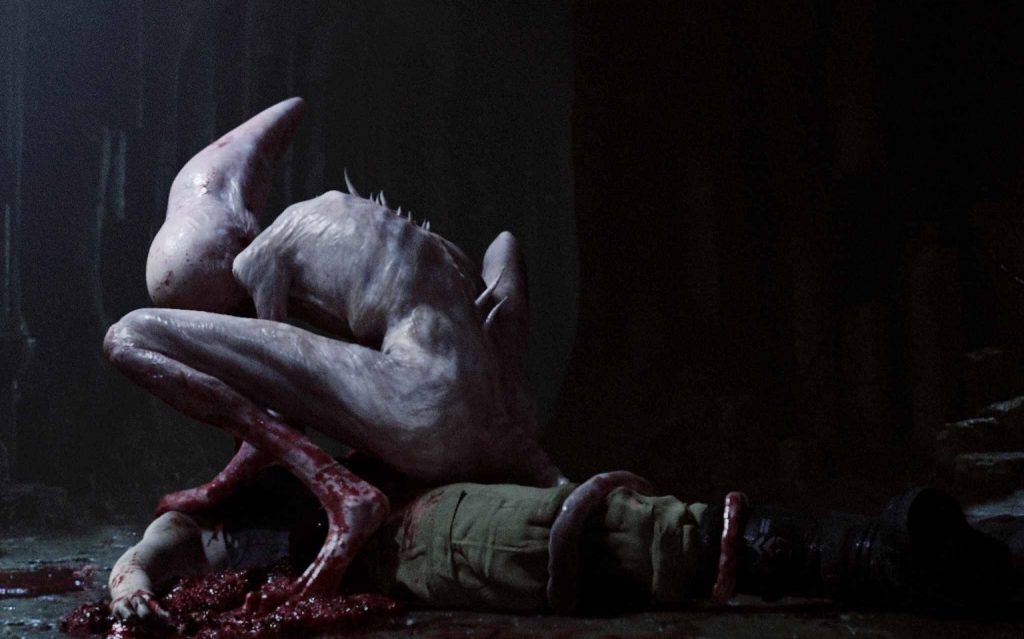
Casual fans of the series may well find a lot to like in this latest Alien film. Scott has tried to undo some of the frankly illogical choices he made in Prometheus by moving away from a direct prequel. Unfortunately he’s created new problems by recycling elements we’ve seen before but with none of the same flare or creative verve. The last act of Covenant is like a condensed version of the 1979 film complete with the same ejected into space method of dispatching the creature that we’ve seen several times now. There isn’t really any part of Alien: Covenant that feels fresh and the writing across the board feels lazy and unfocused. Small positives include a rare serious turn from Danny McBride, generally great visuals and some brilliant musical cues that hark back to Jerry Goldsmith’s stunning score from the 1979 film. Sadly these positives are limited and are outweighed by far too many negative aspects that make it at best a mediocre entry into a series that deserves far better from the man who gave us both the film that started it all and the one that probably remains the series’ best entry. If Ridley Scott pulls off some kind of miracle and gives us a third prequel after Covenant’s middling box office haul, a film that somehow ties up all these loose ends and does what Rogue One did by leading perfectly into the film it precedes, then all will be forgiven. As it stands at the moment, Alien: Covenant does little more than throw up even more questions and makes me wish they’d left the origins of the Space Jockey a mystery and left Alien to be the first film in the series chronologically speaking. What both Prometheus and now to a greater extent Alien: Covenant proves is that some questions really are best left unanswered and some mysteries are best left unsolved.
Film ’89 Verdict – 4/10
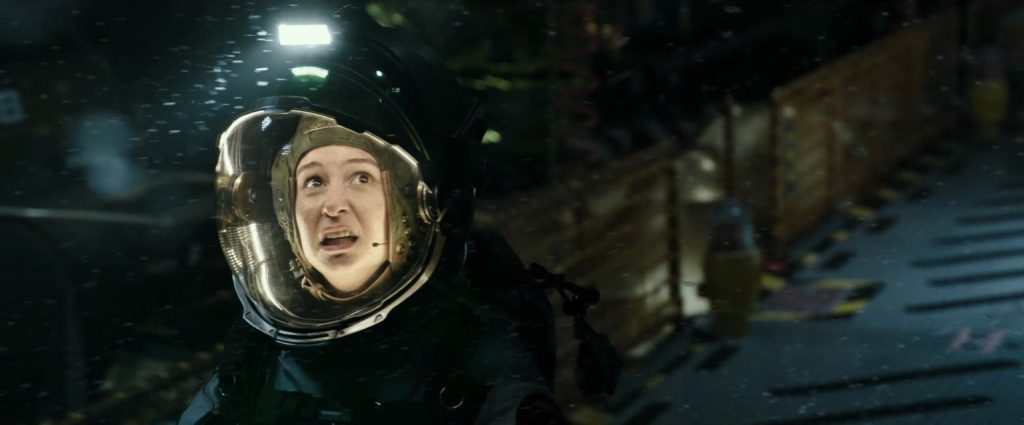
Alien: Covenant is out now on Blu-Ray/DVD in the US and due for UK release September 18th.

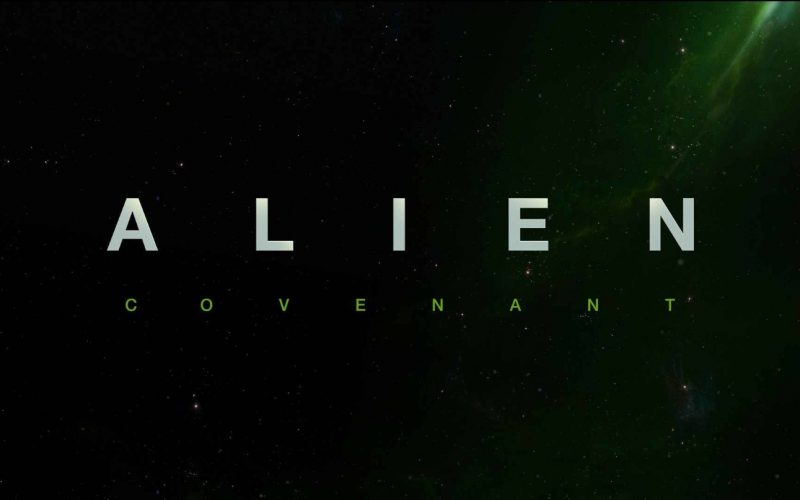
Great review of a terrible film. One thing I have yet to see anyone mention regarding Prometheus, is that how could the engineer found on the planet, who had been there for thousands of years, have had any reason to eradicate humanity? Logically, at the time this engineer had gone into stasis, humanity was basically barely beginning to form societies and far away from any technological advancements making it pointless for an advanced race to wish to wipe out humanity.
As for Covenant, the crew appeared to me to be emotionally unsuited for the responsibilities they were given. They panicked at every opportunity and were totally inept in the face of an emergency. As for the entire premise of the film, it had little if anything at all to add to the story we all are looking for.
This movie also totally eradicates the Aliens vs Predator films as those movies take place decades or centuries before these movies and the aliens in those movies are the ones we all know and love to fear. A much better solution would have been to have the Aliens created by the Predator race of beings as prey to be released on planets for a hunting challenge. Makes more sense than what Scott has thrown up for us.
For me the film started to go downhill when Billy Cruddup’s character refused to allow the proper “burial” of Waterston’s husband. A supposedly religious character going totally against all his beliefs because of a John Denver song?
From then on it was all downhill with the crew displaying either a total lack of or disregard for any training.
Any future releases will be very far removed from my “must see” list following the disappointement of the last 2 films